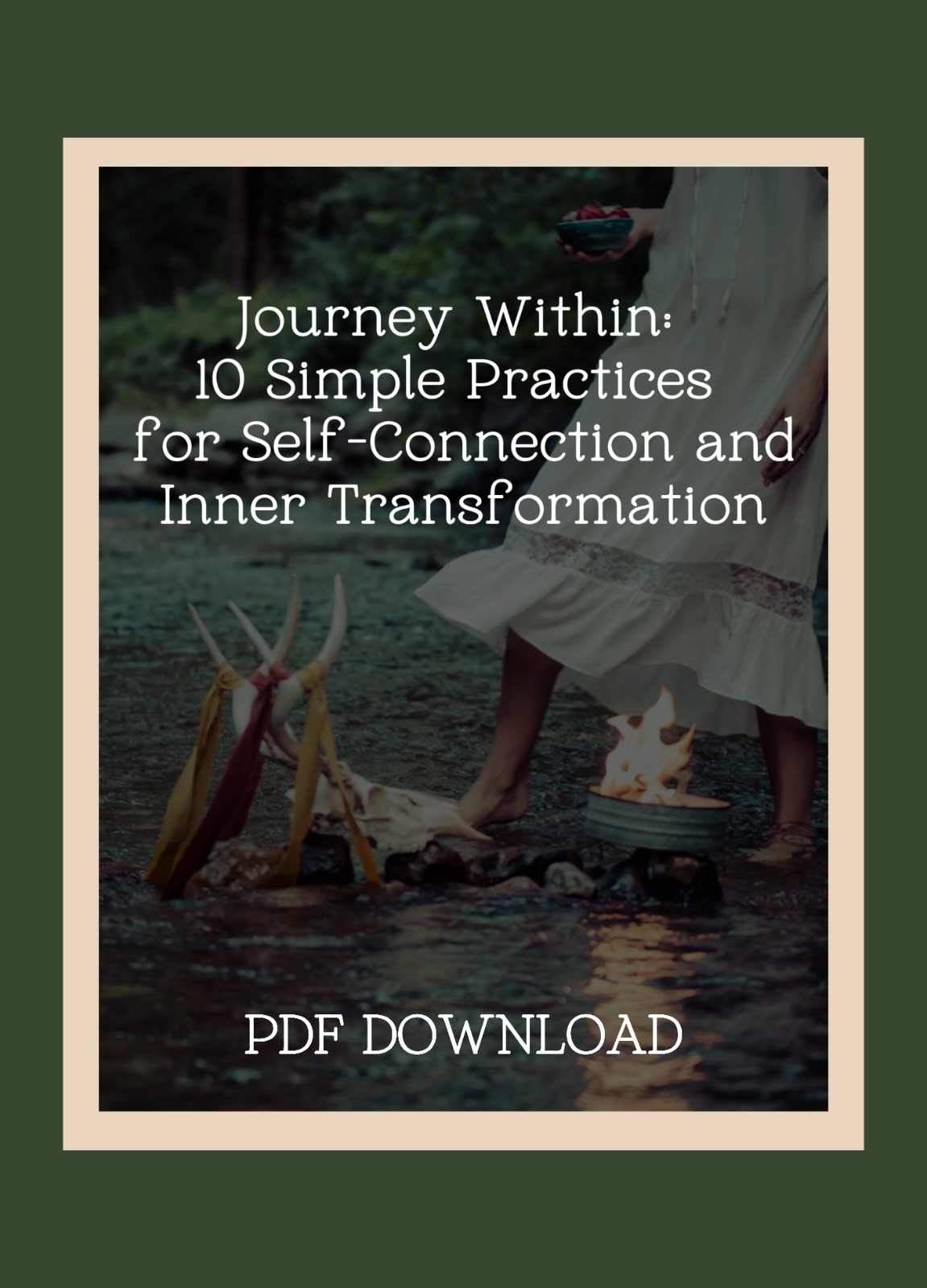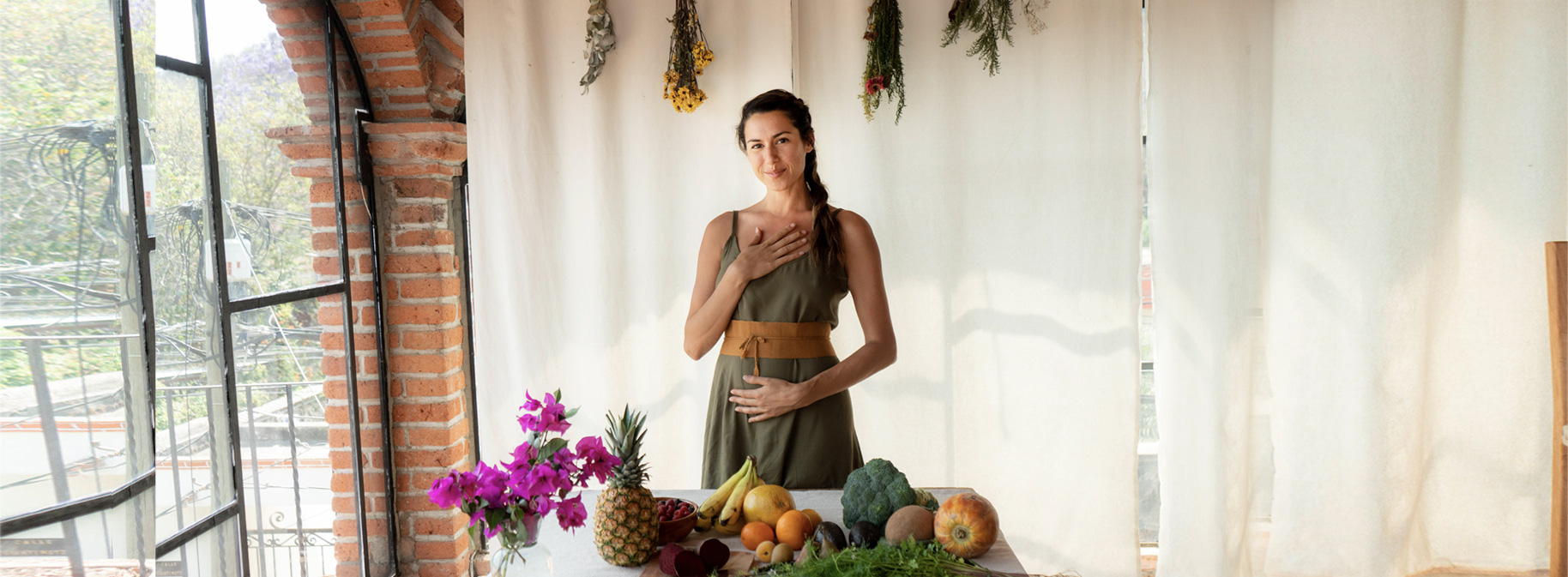05 Jun How Mindful Breathing Can Heal Your Life
How Mindful Breathing Can Heal Your Life
The Transformative Power of Mindful Breathing: Science, Spirituality, and Personal Growth
In our modern lives, it’s easy to overlook the power and significance of something as simple as our breath. Yet, from the moment we are born, to the last breath that we take, our breath accompanies us through our whole lives, serving as a constant reminder of our aliveness.
The powerful practice of breathing with presence goes beyond the simple act of inhaling and exhaling; it becomes a gateway to self-discovery, healing, and personal growth. It can change everything, from the way we react to stressful situations, to our ability to experience pleasure, birth our babies, heal our bodies, and calm our minds. Mindful breathing, a practice deeply rooted in ancient wisdom traditions, has inspired attention in modern times for its potential for regulating our nervous system, healing our body, and enhancing everything from creativity and pleasure to productivity and focus. Mindful breathing offers us an opportunity to tap into this innate power, transforming the way we experience life.

In this blog post, we will explore why mindful breathing is so profoundly transformational, examining both scientific research and spiritual perspectives, and how it can positively influence our reactions, emotions, physical health, and overall sense of wellbeing. So, take a moment to pause, find your intention, take a few present breaths, and join me on this transformative journey.
Why Scientists Love Mindful Breathing
Let’s dive straight for the juicy science bits first! I personally love a bit of well researched evidence before I try something.
Stress Reduction
Mindful breathing literally activates a relaxation response in our body, calming our nervous system and reducing stress levels. Scientific studies have shown that mindful breathing techniques, such as deep abdominal breathing and diaphragmatic breathing, can lower cortisol levels and alleviate symptoms of anxiety and stress (Jerath et al., 2017).
Emotional Regulation
By focusing on the breath, we cultivate presence and awareness. We develop the capacity to observe and regulate our emotions. It slows us down and allows for greater spaciousness to self-soothe, coming back to a nervous system’s sense of center. Mindful breathing has been found to enhance emotional regulation by stimulating the prefrontal cortex and activating the parasympathetic nervous system, promoting feelings of calm and wellbeing (Tang et al., 2009). It also helps create a space between our thoughts and reactions, allowing us to respond to challenging situations with greater clarity and equanimity (Chambers et al., 2009).
Improved Mental Focus
Mindful breathing enhances concentration and mental clarity. Research suggests that regular practice of mindfulness meditation, which often includes focused attention on the breath, can improve attention span, working memory, and cognitive flexibility (Jha et al., 2007). Additionally, studies indicate that regular mindfulness-based breathing practices can improve our overall brain function, ability to pay attention, and overall mental resilience (Tang et al., 2017).
Physical Wellbeing
Deep, intentional breathing improves oxygenation and promotes better circulation throughout the body. It can enhance lung capacity, boost immune function, and support overall respiratory health (Ma et al., 2017). Additionally, mindful breathing can help regulate blood pressure and heart rate, promoting cardiovascular well-being (Joseph et al., 2015).
Spiritual Connection
Mindful breathing is deeply intertwined with spiritual practices across various traditions. It can serve as a gateway to present-moment awareness, self-reflection, and a deeper connection to the present moment, oneself, and the larger universe. Through mindful breathing, we can cultivate a sense of inner peace, connectedness, and spiritual growth.
Scientific studies have shed light on the physiological and psychological benefits of mindful breathing. These benefits are not isolated. It is a holistic wellness upgrade for mind, body and spirit. Neural researchers are finding that several brain regions linked to emotion, attention, and body awareness are activated when we pay attention to breath, supporting the benefits of using mindful breathing for holistic therapeutic purposes (Herrero et al., 2018). Mindful breathing is for our entire wellbeing!!
These scientific findings back up in good form the transformative power of mindful breathing and its potential to positively impact our lives. I’m a sucker for well researched mindfulness practices… Thanks, Science. So, a word from the Sacred.
Spiritual Perspectives
Beyond the scientific realm, mindful breathing holds deep spiritual significance across various traditions. In many spiritual teachings, the breath is regarded as the bridge between the physical body and the subtle realms of consciousness. The air weaving body and spirit. By consciously attuning to our breath, we invite a deeper connection with our true essence, the unconditionally loving presence within us. Mindful breathing becomes a sacred practice, allowing us to access the realm of something deeper, where the subtle whispers of wisdom and intuition vibrate just above the silence. A safe space of healing inside of us. Of trust in life, in our life, in this path we are walking. A powerful access point to the inner calm and clarity, creating a safe space within where we can look at our limiting beliefs, wounds, and greatest fears, and mother ourselves from the inside out. Through this practice, we open ourselves to spiritual insights, self-knowing, expanded consciousness, and a profound sense of interconnectedness with all beings. Generally becoming more awesome with every breath we take.
Personal Growth and Encouragement
Sincerely engaging in a regular mindful breathing practice can change your life, I truly believe this. It is a powerful tool that I use in crisis, in pleasure, and in moments of presence, every day. By cultivating awareness of the present moment through the breath, we learn to respond rather than react to life’s challenges. We become attuned to our thoughts and emotions, enabling us to make conscious choices that align with our authentic selves. It is a tool that ables us to reframe our perspective on the world, offering liberation to our mind cages. Mindful breathing empowers us to cultivate self-compassion, embrace our vulnerabilities, and release limiting beliefs. From tiny mind-splinter moments, to giant boulders that we face on our path. It invites us to fully inhabit the present moment, savoring life’s beauty and finding gratitude in the simplest of experiences. Forgiveness. Compassion.
As you embark on your mindful breathing journey, remember that transformation is a gradual process. Be patient and gentle with yourself, allowing the breath to guide you in each moment. Cultivate a sense of sweet curiosity and wonder as you explore the depths of your own being. Tenderly embrace a mindful breathing practice as a sacred ritual, a way to nourish your mind, body, and spirit.
GET STARTED: 5 Steps to Begin A Mindful Breathing Practice
Create the Space
I often start by recognizing the space I give myself to practice. To listen inwards. This opportunity to slow down, and to notice my breath. To embark on this journey of mindful breathing, it’s hugely helpful to create a space for practice, where you can listen inward and slow down. Check in with your body, have a sip of water, loosen or change out of any restrictive clothing and find a comfortable seat. First listen inwards, meet any needs so you can just sit for a moment, and then, just sit. Allow yourself to fully arrive here & now in this present moment. Take a deep breath, and with loving intention, create the space for your practice. The space you give yourself and the dedication you bring to this moment will create an open sky for transformative experiences to stream through like sunlight.
Expanding Awareness
With a beginner’s mind, open yourself to the teachings and practices that cultivate love, compassion, strength, clarity, and relaxation. Like the curiosity of a loving mother listening to her baby, observe yourself. Simply notice. Start by gently bringing your attention to your chest and belly, observing the natural rhythm of your breath. Notice the expansion and contraction, the ebb and flow of each breath. With curiosity and kindness, listen to the subtle sensations arising within your body. When your mind strays and wants to think about next week’s opera, gently bring yourself back to this moment. Back to your breath.
Releasing Tension
Gradually, direct your awareness up your back, into your neck, and shoulders. Gift yourself a Body Scan. Observe any tension residing in these areas and offer them a warm greeting and a present breath, giving yourself more space to really feel and hold space for them. Hello pain in my back. Inhale… Exhale… Salutations tension in my hips. Inhale… Exhale… I see you, heaviness in my chest. I am here. Inhale… Exhale…
Take a deep breath, allowing the nourishing breath to permeate your entire being. Feel the essence of life filling you with love and vitality. Remember, each breath is a precious gift your Being gives to itself.
Nose and Sensations:
Shift your attention to your nose, where the air enters and exits your body. Close your eyes and immerse yourself in the sensations present in this space. Take a moment to fully feel and experience the subtle flow of your breath in and out like the tide. You are feeling the essence of your being. Allow gratitude to flow in and out like the air you breathe.
Breath Awareness
As you continue to breathe and notice the sensations, remember that breath awareness is self-awareness. Breath connection is self-connection. Breath mindfulness is self mindfulness. Through mindful breathing, we cultivate a deeper connection with ourselves, the beauty and wisdom within, and we hold a very real and sacred space to give attention to our inner landscape. This is a great nurturing to building a greater understanding of our emotions, thoughts, and physical sensations. Intuition. Self-love. The more we become attuned to our breath, the more we awaken to the richness of our existence. Like a silky dark chocolate made with love, we melt in the mouth of our own awareness.
Zooming out, my dear chocolatey friend, I invite you to offer yourself a personal commitment to a breathing practice. I recommend that you incorporate mindful breathing into your daily life, weaving it into the fabric of your existence. Whether you choose to dedicate moments of stillness in the morning, integrate mindful breaths throughout the day, or engage in formal meditation sessions, every breath can be an opportunity for growth and self-discovery.
Conclusion
Mindful breathing is a transformative practice that can infuse every aspect of our lives with a profound sense of presence and well-being. Embrace the scientific evidence, honor the spiritual wisdom, and trust in your innate capacity to experience healing from the inside out. May each breath be a reminder of your inner strength, resilience, and the limitless possibilities that await you.
By dedicating ourselves to this intentional and loving act of breath awareness, we open the door to greater self-connection, self-compassion, and self-empowerment. So, in your daily life, amidst the chaos and demands, remember to return to your breath, anchoring yourself in the here and now. Remember that the body is always present, that our body can bring us back and our breath is the ultimate tool to enrich the present moment with our own sensually alive & vibrant self. Embrace the gift of each breath, and let it guide you on a journey of self-discovery, healing, and transformation.
Take a deep breath, and step into your own magic.
References:
- Chambers, R., Gullone, E., & Allen, N. B. (2009). Mindful emotion regulation: An integrative review. Clinical Psychology Review, 29(6), 560-572.
- Jerath, R., Crawford, M. W., Barnes, V. A., & Harden, K. (2015). Self-regulation of breathing as a primary treatment for anxiety. Applied Psychophysiology and Biofeedback, 42(2), 113-120.
- Jha, A. P., Krompinger, J., & Baime, M. J. (2007). Mindfulness training modifies subsystems of attention. Cognitive, Affective, & Behavioral Neuroscience, 7(2), 109-119.
- Joseph, C. N., Porta, C., Casucci, G., Casiraghi, N., Maffeis, M., Rossi, M., … & Bernardi, L. (2005). Slow breathing improves arterial baroreflex sensitivity and decreases blood pressure in essential hypertension. Hypertension, 46(4), 714-718.
- Herrero, J. L., Khuvis, S., Yeagle, E., Cerf, M., & Mehta, A. D. (2018). Breathing above the brain stem: Volitional control and attentional modulation in humans. Journal of Neural Physiology. Retrieved January 3, 2018, from https://doi.org/10.1152/jn.00551.2017
- Ma, X., Yue, Z. Q., Gong, Z. Q., Zhang, H., Duan, N. Y., Shi, Y. T., … & Li, Y. F. (2017). The effect of diaphragmatic breathing on attention, negative affect, and stress in healthy adults. Frontiers in Psychology, 8, 874.
- Tang, Y. Y., Ma, Y., Fan, Y., Feng, H., Wang, J., Feng, S., Lu, Q., Hu, B., Lin, Y., Li, J., Zhang, Y., Wang, Y., Zhou, L., & Fan, M. (2009). Short-term meditation training improves attention and self-regulation. Proceedings of the National Academy of Sciences, 104(43), 17152-17156.

9 Master Secrets for Feeling More Intuitive, Inspired and Empowered





Sorry, the comment form is closed at this time.